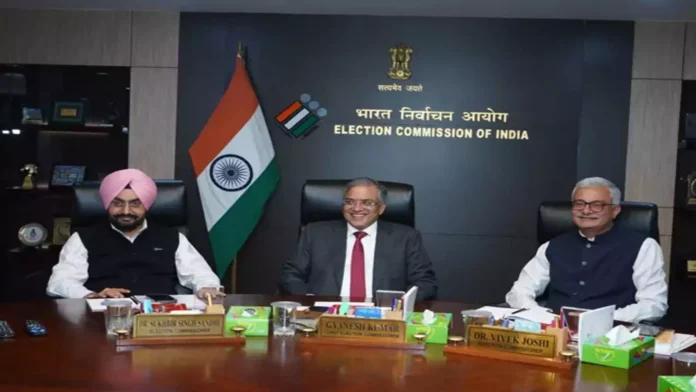The Election Commission of India (ECI) intensified its political engagement by organizing 4,719 structured meetings across the country. Officials met with representatives from various political parties to address concerns and strengthen electoral transparency. The meetings, which concluded on March 31, 2025, aimed to create a more inclusive and accountable electoral process.
ECI officials traveled across states to ensure that all political stakeholders had an opportunity to voice their concerns. These discussions covered issues related to voter registration, polling station accessibility, security arrangements, and the implementation of the Model Code of Conduct. Political leaders urged the commission to take stricter measures against electoral malpractice, while ECI officials reassured them of impartial and efficient election management.
Chief Election Commissioner Rajiv Kumar emphasized the importance of dialogue between the ECI and political parties. He stated that these meetings allowed the commission to better understand ground-level challenges and refine electoral policies accordingly. Kumar reaffirmed the commission’s commitment to conducting free and fair elections, adding that transparency remains a top priority.
During these meetings, political parties expressed concerns about misinformation campaigns and voter intimidation. The ECI assured them that it would take strict action against any violations. Officials highlighted the use of advanced monitoring technology to track online and offline election-related activities, ensuring compliance with election laws.
Security arrangements featured prominently in the discussions, especially in states with a history of electoral violence. The ECI coordinated with law enforcement agencies to enhance security at polling stations and prevent disruptions. Officials also reviewed measures to ensure the safety of polling staff and voters.
In addition to security, the commission addressed concerns regarding electronic voting machines (EVMs) and the voter-verified paper audit trail (VVPAT) system. Political parties requested greater transparency in the handling of these devices. The ECI reiterated its commitment to using tamper-proof technology and allowing independent audits of the voting process.
Officials also engaged with regional political leaders to discuss state-specific challenges. In some areas, parties raised issues regarding discrepancies in voter lists, prompting the ECI to promise a thorough review. The commission assured them that it would take corrective measures to ensure that every eligible voter is registered.
The meetings also provided a platform to discuss campaign finance regulations. Political leaders demanded stricter enforcement against excessive spending and unaccounted campaign funds. The ECI emphasized its commitment to monitoring financial disclosures and taking action against violations.
Apart from engaging with political parties, the ECI sought input from civil society organizations and election observers. These interactions helped the commission identify areas for improvement in voter education and accessibility. The ECI also discussed initiatives to increase voter turnout, particularly among first-time voters and marginalized communities.
Technology played a crucial role in these consultations. The commission showcased its latest digital initiatives, including real-time reporting tools for election violations and an updated voter helpline app. Officials encouraged political parties to leverage these tools for better coordination and issue resolution.
Throughout the discussions, the ECI maintained that constructive political engagement is essential for strengthening democracy. It acknowledged feedback from all parties and promised to incorporate their suggestions into future election planning. By holding these extensive consultations, the commission demonstrated its commitment to transparency and accountability.
With the general elections approaching, the ECI reaffirmed its readiness to manage the electoral process efficiently. Officials stated that the insights gained from these meetings would help refine operational strategies and ensure a seamless voting experience. The commission remains focused on upholding democratic values and conducting elections that reflect the will of the people.




